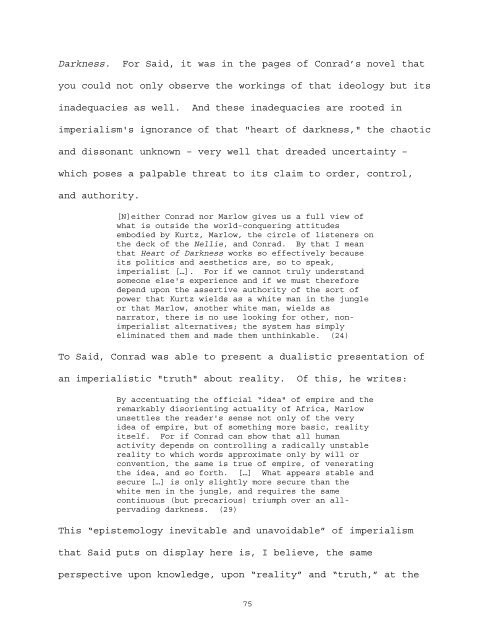Stony Brook University - SUNY Digital Repository
Stony Brook University - SUNY Digital Repository
Stony Brook University - SUNY Digital Repository
You also want an ePaper? Increase the reach of your titles
YUMPU automatically turns print PDFs into web optimized ePapers that Google loves.
Darkness. For Said, it was in the pages of Conrad’s novel that<br />
you could not only observe the workings of that ideology but its<br />
inadequacies as well. And these inadequacies are rooted in<br />
imperialism's ignorance of that "heart of darkness," the chaotic<br />
and dissonant unknown – very well that dreaded uncertainty –<br />
which poses a palpable threat to its claim to order, control,<br />
and authority.<br />
[N]either Conrad nor Marlow gives us a full view of<br />
what is outside the world-conquering attitudes<br />
embodied by Kurtz, Marlow, the circle of listeners on<br />
the deck of the Nellie, and Conrad. By that I mean<br />
that Heart of Darkness works so effectively because<br />
its politics and aesthetics are, so to speak,<br />
imperialist […]. For if we cannot truly understand<br />
someone else's experience and if we must therefore<br />
depend upon the assertive authority of the sort of<br />
power that Kurtz wields as a white man in the jungle<br />
or that Marlow, another white man, wields as<br />
narrator, there is no use looking for other, nonimperialist<br />
alternatives; the system has simply<br />
eliminated them and made them unthinkable. (24)<br />
To Said, Conrad was able to present a dualistic presentation of<br />
an imperialistic "truth" about reality. Of this, he writes:<br />
By accentuating the official “idea" of empire and the<br />
remarkably disorienting actuality of Africa, Marlow<br />
unsettles the reader's sense not only of the very<br />
idea of empire, but of something more basic, reality<br />
itself. For if Conrad can show that all human<br />
activity depends on controlling a radically unstable<br />
reality to which words approximate only by will or<br />
convention, the same is true of empire, of venerating<br />
the idea, and so forth. […] What appears stable and<br />
secure […] is only slightly more secure than the<br />
white men in the jungle, and requires the same<br />
continuous (but precarious) triumph over an allpervading<br />
darkness. (29)<br />
This “epistemology inevitable and unavoidable” of imperialism<br />
that Said puts on display here is, I believe, the same<br />
perspective upon knowledge, upon “reality” and “truth,” at the<br />
75
















